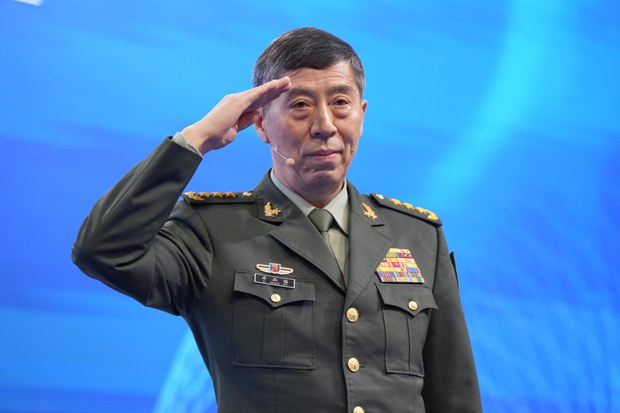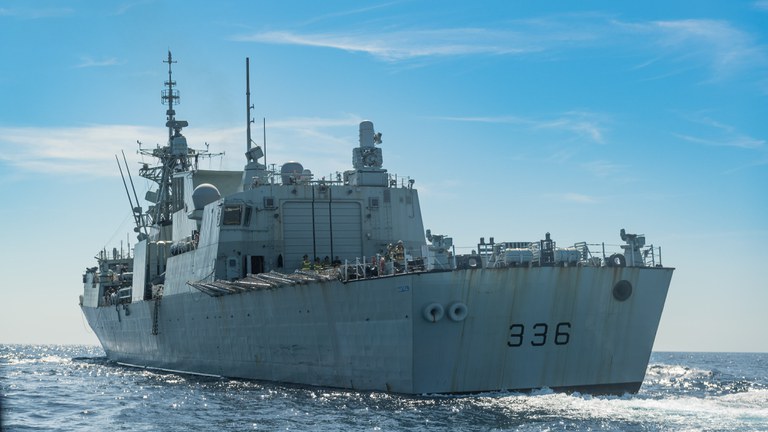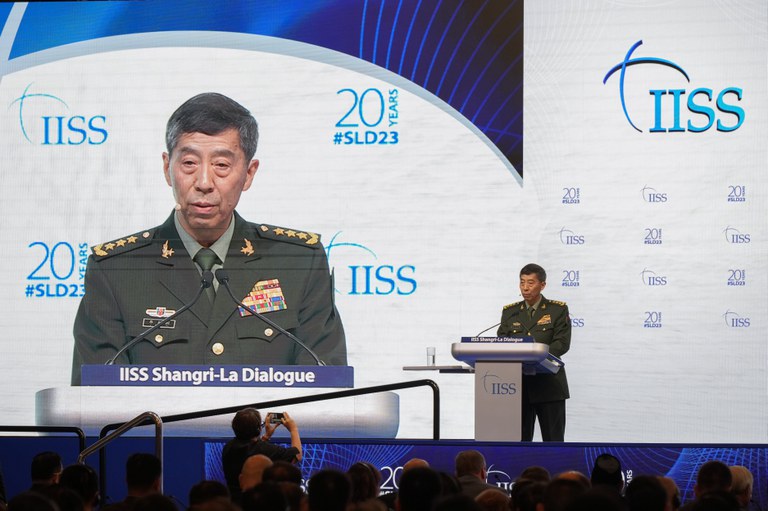Beijing seeks ‘dialogue over confrontation,’ defense chief says
2023.06.04
 Chinese Defense Minister Li Shangfu salutes as he steps to the podium at the 20th Shangri-La Dialogue, in Singapore, June 4, 2023.
Chinese Defense Minister Li Shangfu salutes as he steps to the podium at the 20th Shangri-La Dialogue, in Singapore, June 4, 2023.
Beijing seeks dialogue over confrontation, China’s defense minister told a major regional security forum Sunday, hours after the American military accused the Chinese navy of provoking a near collision with a U.S. destroyer in the Taiwan Strait.
In his first international speech as China’s defense chief, Gen. Li Shangfu accused “some country” of taking a “selective approach to rules and international laws,” and “forcing its own rules on others” – a thinly veiled reference to the United States, Beijing’s rival superpower.
Chinese President Xi Jinping has proposed a set of Global Security Initiatives (GSI) that feature “dialogue over confrontation, partnership over alliance and win-win over zero sum,” Li told the Shangri-La Dialogue on the last day of the security conference in Singapore.
In his criticism of the U.S., he said “it practices exceptionalism and double standards and only serves the interests and follows the rules of a small number of countries.”
The U.S. “even attempts to constrain others with a convention itself has not acceded to,” the Chinese minister of defense noted. He was pointing to the 1982 United Nations Convention on the Law of the Sea (UNCLOS), which the United States has not ratified but now recognizes as international law.
Washington and Beijing have been at loggerheads over a number of issues, among them China’s extensive claims in the South China Sea and U.S. freedom of navigation operations (FONOPs) in the contested waters. China has repeatedly accused the U.S. of “navigation hegemony” there.
US military: close call at sea
The U.S. Indo-Pacific Command, meanwhile, said that a Chinese warship had twice crossed in front of the bow of an American destroyer, causing the latter to slow down to avoid a collision as it sailed with a Canadian navy ship through the Taiwan Strait on Saturday.
The guided-missile destroyer USS Chung-Hoon and Royal Canadian Navy frigate HMCS Montreal were conducting a “routine south to north transit” through the Taiwan Strait transit” when the incident occurred, the U.S. regional command said in a statement.
The Chinese Navy destroyer “executed maneuvers in an unsafe manner in the vicinity of Chung-Hoon,” it said, adding that at one point, the Chinese ship “overtook Chung-Hoon on their port side and crossed their bow at 150 yards [140 meters].”
“Chung-Hoon maintained course and slowed to 10 knots to avoid a collision.”
The regional command said that China’s actions violated the maritime ‘Rules of the Road’ of safe passage in international waters “where aircraft and ships of all nations may fly, sail and operate anywhere international law allows.”
China’s Ministry of National Defense issued its own statement about the intercept at sea.
It said the naval and air forces of the People’s Liberation Army’s Eastern Theater Command had conducted “tracking and monitoring” of the U.S. and Canadian ships “lawfully and professionally.”

But analysts said they found the event “disturbing” and “probably the worst such reported close maritime encounter in the South China Sea since October 2018,” when a Chinese warship approached the USS Decatur within just 45 yards (41 meters).
“China is getting reckless while trying to enforce sovereignty in the Taiwan Strait,” said Richard Bitzinger, a senior fellow at the S. Rajaratnam School of International Studies in Singapore.
“Beijing is just trying to force everyone to accept the idea that Taiwan Straits are somehow China’s de facto territorial waters,” the military analyst told Radio Free Asia, a news service affiliated with BenarNews.
Taiwanese military analysts said that the Saturday transit was a routine operation but the Chinese Navy’s reaction indicated a more resolute stance.
“As President Xi Jinping had instructed, senior officials and military leaders should take a tough stance against challenges rather than showing a soft behavior that can be seen as weak,” said Shen Ming-shih, acting deputy CEO of Taiwan’s Institute for National Defense and Security Research.
“That’s what the Chinese Defense Minister demonstrated in his speech at the Shangri-La Dialogue,” Shen said.
Military expert Bitzinger said the reason behind this approach may be that “the Chinese are worried that they have a narrow and closing window to exert themselves before the economy tanks and demographics catch up with them.”
Li: pretext for ‘hegemony of navigation’
In his speech in Singapore, Minister Li said that U.S. ships were in the region “for provocation.”
“What is key now is that we must prevent attempts to use freedom of navigation … as a pretext to exercise hegemony of navigation,” he said.
Li also lambasted the U.S.’s Cold War mentality.
He accused Washington of “expanding military bases, re-enforcing military presence and intensifying arms race in the region” – actions that reflect its “desire to make enem[ies], stoke confrontation, fuel the fire and fish in troubled waters.”
Li criticized the U.S. for “willfully interfering in the internal affairs of others.” He was referring to the issue of Taiwan which, Li said, was the “core of China’s core interests.”
The U.S. and China should seek common ground “grow bilateral ties and deepen cooperation,” he said.
“International affairs should not be handled through confrontation,” the minister said, insisting that China was always “seeking consensus, promoting reconciliation and negotiations.”

A day earlier at the Singapore forum, U.S. Secretary of Defense Lloyd Austin said he was “deeply concerned” that Beijing had been unwilling to engage in dialogue with Washington and refused to hold direct bilateral talks.
“The Chinese minister’s speech at the Shangri-La Dialogue and the dangerous action of its warships in the Taiwan Strait are part of the strategy that I’d call ‘riskfare,’ which plays on the concerns of the U.S. and other countries for risks,” said Alexandre Vuving, a professor at the Daniel K. Inouye Asia-Pacific Center for Security Studies in Honolulu.
“The U.S. emphasizes communication, but China emphasizes risks and is using risk as a weapon in its struggle with the U.S.,” he said. “Washington shows it’s concerned about risks in its competition with Beijing. Beijing sees it and weaponizes this U.S. concern.”
Washington’s willingness to reopen communications with China is genuine, according to analysts. Some believe that, despite the absence of direct contacts between the U.S. and Chinese delegations in Singapore, there are hopes for closer interactions.
The U.S announced on Saturday that Daniel Kritenbrink, the assistant secretary of state for East Asian and Pacific Affairs, and Sarah Beran, senior director for China and Taiwan Affairs at the National Security Council, were to visit Beijing this for talks with Chinese officials.
Baohui Zhang, director of the Centre for Asian Pacific Studies at Lingnan University in Hong Kong, told RFA that the “communication” issue in U.S.-China relations has been somewhat exaggerated.
“The truth is that the two sides are communicating with each other,” Zhang said, noting that the Director of the Central Intelligence Agency, William Burns, reportedly paid a secret visit to China last month.
Jake Sullivan, the top U.S. national security official, also met with his Chinese counterpart Wang Yi in May. The trade ministers of the two countries have also met.
“My own view is that both sides appreciate the importance of maintaining dialogues to prevent misunderstanding and inadvertent crisis situations,” the analyst said.
“Neither side wants war and they still maintain sufficient dialogues with each other,” he said.
This report was produced by Radio Free Asia.







